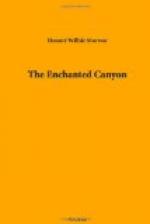Jonas, brushing the snow from Enoch’s broad shoulders, said casually: “I had a telegram from Na-che this evening, boss. She and Miss Diana start for Havasu canyon to-morrow.”
Enoch started. “Why, how’d she happen to wire you, Jonas?”
“I done told her to,” replied Jonas coolly, “and moreover, I left the money for her to do it with.”
Enoch said nothing until he was standing in his dressing-gown before his bedroom fire. Then he turned to Jonas and said:
“Old man, it won’t do. I can’t stand it. I must not be able to follow her movements or I shall not be able to keep my mind on matters here. I shall never marry, Jonas. All the charms and all the affectionate desires of you and Na-che cannot change that.”
Jonas gave Enoch a long, reproachful look that was at the same time well-tinctured with obstinacy. Without a word he left the room.
CHAPTER XVI
CURLY’S REPORT
“And now my house-mate is Grief. But she is wise and beautiful as the Canyon is wise and beautiful and I claim both as my own.”—Enoch’s Diary.
The Washington papers, the next morning, contained the accounts of two very interesting dinner parties. One was a detailed story of the President’s dinner. The other told of the public meeting and reconciliation of Secretary Fowler and Hancock Brown. The evening papers contained, as did the morning editions the day following, widely varied comment on the two episodes.
Enoch did not see the President for nearly a week after the dinner party, excepting at the cabinet meeting. Then, in response to a telephone call one evening, he went to the White House and told the President of his break with Fowler.
“That was a curious thing for him to do,” commented the chief executive. “It looks to me like a plain case of losing his temper.”
“It struck me so,” agreed Enoch.
“Do you think that he had anything to do with the publishing of that canard about you, Huntingdon?”
“I would not be surprised if he had. If I find that he was mixed up in it, Mr. President, I shall have to punish him as well as Brown.”
“Horsewhipping is what Brown deserves,” growled the President. “Huntingdon, why are they after Cheney?”
“I’ve told him to find out,” replied Enoch. “I want him to put himself in the position of being able to give them the lie direct, and then resign.”
“Who is after him?”
“I believe, if we can probe far enough, we’ll find this same Mexican controversy at the bottom of it. Cheney has been immensely interested in the fuel problem. He’s given signal help to the Bureau of Mines.”
The telephone rang, and the President answered it. He returned to his arm-chair shortly, with a curious smile on his face.
“Secretary Fowler wants to see me. I did not tell him that you are calling. As far as he has informed me, you and he are still on a friendly basis. He will be along shortly, and I shall be keenly interested in observing the meeting.”




